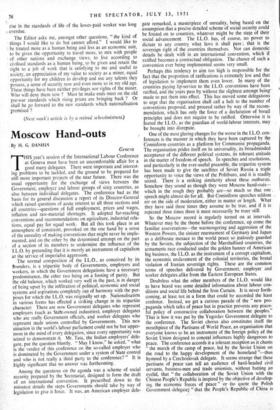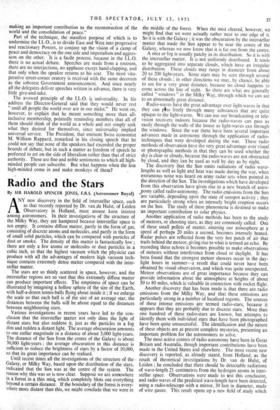Moscow Hand-outs
By H. G. DANIELS
Geneva HIS year's session of the International Labour Conference at Geneva must have been an uncomfortable affair for a good many delegates. There were important and interest- ing problems to be tackled, and the ground to be prepared for still more important projects of the near future. There was the usual opportunity for the exchange of views between the Government, employcr and labour groups of sixty countries, as also between individual delegates. The conference had as the basis for its general discussion a report of its Director-General which raised questions of acute interest to all three sections and all countries—questions of full employment, prices and wages, inflation and raw-material shortages. It adopted far-reaching conventions and recommendations on agriculture, industrial rela- tions, equal pay for equal work. But all this took place in an atmosphere of constraint, provoked on the one hand by a sense of the unreality of making conventions that might never be imple- mented, and on the other by the determined attempt on the part of a section of its members to undermine the influence of the *I.L.O. by pretending that it is merely an instrument of capitalism at the service of imperialist aggression.
The normal composition of the I.L.O., as conceived by its founders, is a tripartite body of Governments, employers and workers, in which the Government delegations have a necessary predominance, the other two being on a footing of parity. But the old balance, which worked very well in the past, is in danger of being upset by the infiltration of political, economic and social systems and aspirations completely out of harmony with the pur- poses for which the I.L.O. was originally set up. Nationalisation in various forms has effected a striking change in its tripartite character. There are now Government delegates who represent employers (such as State-owned industries), employer delegates who are really Government officials, and worker delegates who represent trade unions controlled by Governments. This new -situation in the world's labour parliament could not be but upper- most in the mind of every delegation, since every opportunity was seized to demonstrate it. Mr. Tata, the Indian employers' dele- gate, put the question bluntly.. " May I know," he asked, " what is the verdict of this conference on the so-called employer who is dominated by the Government under a system of State control and who is not really a third party to the conference? " It is highly significant that no answer was forthcoming.
Among the questions on the agenda was a scheme of social security prepared by the Secretariat, designed to form the draft of an international convention. Ix prescribed down to the minutest details the steps Governments should take by way of legislation to give it force. It was, an American employer dele- gate remarked, a masterpiece of unreality, being based on the - assumption that a precise detailed scheme of social security could be foisted on to countries, whatever might be the state of their social advancement. The I.L.O. has, of course, no power to dictate to any country what laws it shall pass ; that is the sovereign right of the countries themselves. Nor can domestic- details be dealt wits in, an international convention, which if ratified becomes a contractual obligation. The chance of such a convention ever being implemented seems very small.
Perhaps this tendency to aim too high is responsible for the fact that the proportion of ratifications is extremely low and that of legislation to implement them even lower. In many of the countries paying lip-service to the I.L.O. conventions have been ratified, and the years pass by without the slightest attempt being– made to put them into effect. This has moved some delegations to urge that the organisation shall call a halt to the number .of conventions proposed, and proceed rather by way of the recom- mendation, which has only the force of a declaration of broad principles and does not require to be ratified. Otherwise it is feared the I.L.O., as the guardian of world-labour interests, may be brought into disrepute.
, One of the most glaring changes for the worse in the I.L.O. con- ferences is the manner in which they have been captured by the Cominform countries as a platform for Communist propaganda. The organisation prides itself on its universality, its broadminded acceptance of the different political systems, its tolerant attitude in the matter of freedom of speech. In speeches and resolutions, and particularly in the ever-useful preamble, the tripartite system has been made to give the satellites of Soviet Russia a triple opportunity to voice the views of the Politburo, and it is readily seized. There is a striking similarity about these. outbursts. Somehow they sound as though they were Moscow hand-outs— which in the rough they probably are—so much so that one . speech might almost do for all. But Cominform speeches seldom – err on the side of moderation, either in matter or length. What- they have said three times they assume to be true, and if it is repeated three times three it must necessarily be truer still.
So the Moscow record is regularly turned on at intervals. Whatever may be the theme before the conference, up come the familiar asseverations—the warmongering and aggression of the Western Powers, the sinister rearmament of Germany and Japan as a deliberate menace to the world peace so jealously guarded by the Soviets, the subjection of the Marshallised countries, the armaments race conducted under the golden banner of American big business, the I.L.O. as the instrument of a corrupt capitalism, the economic enslavement of the colonial territories, the brutal violation of Iranian sovereign rights. These are the common terms of speeches delivered by Government; employer and worker delegates. alike from the Eastern European States.
Doubtless what the other members of the I.L.O. would like to have heard was some detailed information about labour con- ditions and social life behind the Iron Curtain. It is never forth- coming, at least not in a form that could be accorded the least credence. Instead, we get a curious parade of the " new pro- , paganda which talks of peace but in practice prevents any-peace- ful policy of constructive collaboration between the peoples." That is how it was put by the Yugoslav Government delegate to the conference. The Soviet chorus also constitutes itself the mouthpiece of the Partisans of World Peace, an organisation that everyone knows to be an instrument of the foreign policy of the Soviet Union designed to conceal influences highly dangerous to peace. The conference accords it a tolerant reception as it chants the march of the camp of peace, led by the Soviet Union on the road to the happy development of the homeland "—thus hymned by a Czechoslovak delegate. It seems strange that these partisans of peace Ican tell an audience of hard-headed civil servants, business-men and trade unionists, without batting an eyelid, that " the collaboration of the Soviet Union with the Chinese People's Republic is inspired by the objective of develop- ing the economic forces of peace " or (to quote the Polish Government delegate) "that the People's Republic of China is making an important • contribution to the reconstruction of the world and the consolidation of peace."
Part of the technique, the manifest purpose of which is to undermine the I.L.O., is to divide East and West into progressive and reactionary Powers, to conjure up the vision of a camp of peace and democracy on the one side and imperialism and aggres- sion on the other. It is a facile process, because in the I.L.O. there is no actual debate. Speeches are made from a rostrum, there are no interjections, no applause except hand-clapping, and that only when the speaker returns to his seat. The most vitu- perative street-corner oratory is received with the same decorum as the soberest Government announcement. And since nearly all the delegates deliver speeches written in advance, there is very little give-and-take.
The avowed principle of the I.L.O. is universality. In his address the Director-General said that they would never rest " until all people the world over are in our midst." He went on, however, to explain that he meant something more than all- inclusive membership, pointedly reminding members that all of them should think of the world as a whole and not simply seek what they desired for themselves, since universality implied universal service. The President, that eminent Swiss economist M. William Rappard, remarked in his closing speech that he could not say that none of the speakers had exceeded the proper bounds of debate, but in such a matter as freedom of speech he preferred to err on the side of liberalism rather than that of strict authority. These are fine and noble sentiments to which all high- minded people can subscribe. But what happens when the less high-minded come in and make monkeys of them?







































 Previous page
Previous page